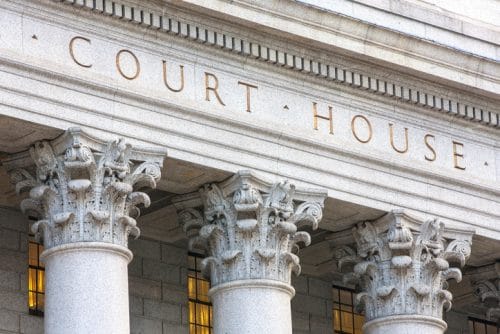The majority of personal injury cases settle outside of court.

When you have been injured in an accident because someone else has been negligent, you have the right to be compensated for the damages you have suffered. In most cases, these damages are collected either by filing an insurance claim or by filing a lawsuit if a settlement cannot be reached with the insurance company. Filing a lawsuit can be difficult and stressful, particularly for someone who is still recovering from injuries from an accident. For most people who have been hurt in an accident, the last thing that they want to do is to go to trial.
Fortunately, the vast majority of personal injury lawsuits never end up going to court. That is because it is rarely in either party’s best interests for the case to go before a judge or a jury. Understanding the process of personal injury lawsuits can help ease your stress and get a better idea of whether or not your case will go to trial.
The Start of a Personal Injury Case
A personal injury lawsuit begins after an initial consultation with a personal injury lawyer. Typically, your attorney will issue a demand letter to the person who caused the injury (the defendant). This letter will outline your case, stating the facts, how they caused your injury, and the damages that you are seeking. The letter is usually sent to the insurance company for the defendant, who will conduct their own investigation of the case and respond to the letter with their own evaluation of the case. The insurance company will generally have a counter-offer that is very low; there will then be a series of negotiations between your personal injury attorney and the insurance company until a reasonable settlement can be reached.
However, in some cases, the insurance company refuses to budge and will not negotiate a settlement. In those situations, your personal injury attorney will likely advise you that the best course of action is to file a lawsuit against the defendant. This lawsuit will be filed in the local courthouse, and served upon the defendant. The defendant will usually be represented by lawyers paid for by his insurance company, and will have a certain number of days to file a response to the lawsuit, known as an answer.
After the lawsuit and an answer are filed, the pre-trial and discovery process begins. Discovery is the process where the parties exchange information about the case, which can take a number of forms. You may be asked to provide documents, submit to a medical examination, or go to a deposition where you will be asked to answer questions.
Avoiding Trial
Throughout the pre-trial and discovery process, the insurance company and your personal injury attorney will likely continue to negotiate. They will use the information that they have learned in the discovery phase to push for their position — that the settlement should be higher or lower. Going to court is a risky proposition for both sides, because it tends to be all or nothing — a judge could dismiss the case entirely, a jury could find completely in your favor or completely against you. In addition, whoever loses the case could appeal the verdict, which could drag the case out for several more years. Given this, it is usually far more preferable for both parties to settle the case outside of court whenever possible. If the parties cannot do that on their own, they may explore options such as mediation or arbitration to help them come to an agreement with the help of a third party.
Having an experienced personal injury attorney can make the difference in getting the compensation that you deserve for your injuries — while avoiding going to court. While no result is guaranteed, a skilled personal injury attorney can help guide you to the best possible outcome. If you have been hurt in an accident, contact the Law Offices of Larry H. Parker today at 800-333-0000 or info@larryhparker.com to schedule a free initial appointment. We never charge a fee unless we get money for you!



